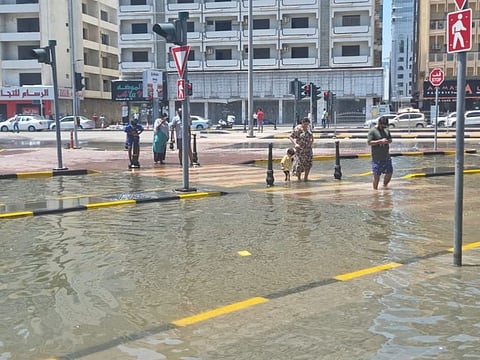Doctors warn of health risks, provide preventive tips after heavy rains in UAE
People stuck in flooded areas, volunteers serving them should take precautionary measures

Dubai: With the recent onslaught of the heaviest rains and flooding in the UAE, doctors have warned residents about the health risks that often accompany such weather events.
Doctors advised residents, especially children, against playing in flood water for fun and cautioned residents and volunteers, who cannot avoid wading through stagnant water, against the potential risks, urging them to take precautionary measures.

Dr Lina Yousif, consultant, Family Medicine at American Hospital Dubai and director of Nad Al Sheba Clinic, shed light on the multitude of contaminants that floodwaters could harbour.
Contamination
“Floodwaters may contain many things that may harm health,” she pointed out.
“We don’t know exactly what is in stagnant floodwater at any given point in time. It could contain various types of hazardous waste, germs and contaminants that can lead to illness. There could be physical objects such as lumber and debris and there could even be stray animals such as rodents and snakes. There could also be a risk of exposed power lines.”
Exposure to contaminated floodwater can cause wound infections, skin rash, gastrointestinal illness, tetanus etc, said Dr Yousif.
She said there could also be the risks of Leptospirosis and Melioidosis.
Leptospirosis is a bacterial infection that people can get from contact with water or soil contaminated by the urine of infected animals, causing symptoms ranging from flu-like illness to potentially severe complications.
Melioidosis is a bacterial infection caused by a bacterium found in soil and water, typically affecting the lungs and causing a range of symptoms from mild flu-like illness to severe pneumonia.
Risks of stagnant water
Dr Khalid Mamdooh Alkubaisy, specialist, Internal Medicine, Medeor Hospital, Abu Dhabi, pointed out other specific health risks posed by floodwater lying stagnant around buildings.
“Stagnant water becomes a breeding ground for various pathogens, including bacteria, viruses, and parasites. These can lead to diseases like cholera, typhoid fever, and hepatitis A,” he said.

Dr Alkubaisy also highlighted the risks of vector-borne diseases. “Mosquitoes breed in stagnant water. This can lead to an increase in mosquito-borne diseases such as dengue fever and malaria in case stagnant water is not cleared soon. However, these are rare in this region.”
Physical, mental concerns
Echoing the same concerns, Dr Nizar Razak, general practitioner, Aster Clinic, Al Quoz, said asthma exacerbation and allergic reactions are some other diseases that can occur after heavy rains.

“Mold spores and dampness can flare up respiratory conditions like asthma, allergies and may lead to respiratory infections,” he said.
While Dr Alkubaisy warned of potential physical injuries or accidents from slippery surfaces, Dr Razak said mental health could also be impacted as such unprecedented scenarios can cause anxiety and stress especially in people who have faced property damage or displacement.
How to protect yourself
“It is important to protect yourself from exposure to floodwater regardless of the source of contamination. The best way to protect yourself is to stay out of the water. If you must enter floodwater, wear rubber boots, rubber gloves, and goggles,” said Dr Yousif.
If you come in contact with floodwater, she said the following measures should be taken.
“Wash the area with soap and clean water as soon as possible. If you don’t have soap or water, use alcohol-based wipes or sanitizer. Take care of wounds and seek medical attention if necessary. Wash clothes contaminated with floodwater in hot water and detergent before reusing them.”
Advice for families
Addressing families living in affected areas, Dr Yousif said they should protect themselves and their loved ones from diarrheal diseases.
“Wash your hands after contact with floodwater. Also be sure to wash children’s hands with soap and water often and always before meals. Do not allow children to play in floodwater areas. Do not allow children to play with toys that have been contaminated by floodwater and have not been disinfected.”
Advice for motorists
If there is oil spill from cars submerged in flood waters, people have to be more cautious. In such areas, she said residents should wear protective gear like rubber gloves and boots. “Do not handle bare handed, do not smoke or bring ignition near that, do not try and switch on the vehicles. Wash hands and eyes thoroughly if you come to contact with such chemicals.”
Advice for volunteers
Dr Razak, who emphasised the need for individuals to prioritise safety, practise good hygiene, and seek medical assistance when necessary, also provided advice for volunteers and residents who may have to wade through flood waters.
“Volunteers and individuals entering floodwaters should prioritise safety by refraining from exposure by wearing protective gear like gloves and boots, practising frequent hand washing, handling flood-damaged items cautiously, avoiding electrical hazards, and promptly reporting any health hazards to emergency response teams. Also, people who are known to have allergies and asthmatics should refrain from getting exposed to such adverse conditions,” he added.
Fight mosquitoes
Apart from avoiding contact with stagnant water and ensuring personal hygiene, Dr Alkubaisy said residents should take precautions against mosquito bites. “Use mosquito repellent, wear long sleeves and pants, and use mosquito nets to protect against mosquito bites. Try to eliminate standing water around your home to prevent mosquito breeding.”
Follow instructions
Doctors also urged residents to follow instructions from building managements and facility services regarding any potential contamination of their water tanks.
In one such incident, a facility management company in Sharjah alerted residents about the domestic water tank getting contaminated with floodwater.
“For your safety, please do not use the water for drinking, cooking, or any personal use until further notice. We apologise for the inconvenience and appreciate your understanding. Our team is working diligently to resolve the issue as soon as possible. We will update you when the water supply is safe to use again,” the notice sent out to the residents said.



